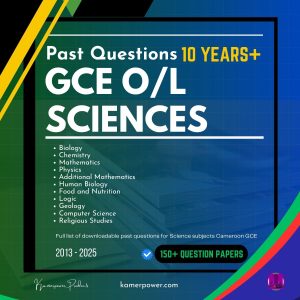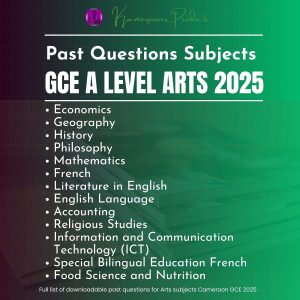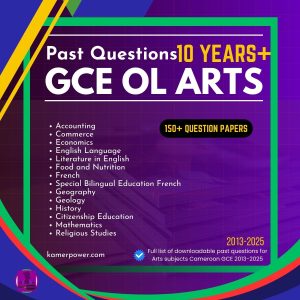Cameroon GCE Board A Level Philosophy syllabus 790
Contents
Cameroon GCE Board A Level Philosophy syllabus.
790 PHILOSOPHY
Kamerpower team always have its students best interest at heart, so we always make sure we bring to your door step any article that will be of help to you all, especially as all GCE candidates preparing for their registered subjects this year. Cameroon GCE Board A Level Philosophy syllabus.
-
INTRODUCTION
Advanced Level Philosophy is designed to introduce the learners to critical reflection on some selected areas of philosophical inquiry: Logic, History of Western Philosophy, African Philosophy, Textual Analysis and Philosophical Problems. This will enable the learners to acquire techniques in critical thinking and judgment, open discussion and reasoned debate, and objectivity that come with philosophical orientation.
2. AIMS
The aims of teaching Philosophy at the Advanced Level are
- To initiate and sensitize the learners to develop a critical and reflective mind as well as recognize, evaluate and distill arguments.
- To develop in the learners an appreciation of different philosophical systems and to apply philosophical approaches to problems.
- To introduce the learners to philosophical methods and the study of philosophical texts.
- To enable the learners relate the understanding of the nature and development of the human being to relevant contemporary issues.
3. GENERAL OBJECTIVES
- Demonstrate a mastery of logical reasoning and skills.
- Understand the major philosophical systems of Western Philosophy and their influence on issues of universal concern.
- Demonstrate a sound familiarity with the core elements of African philosophical thought and practice.
- Understand prescribed and ‘unseen’ philosophical texts and their practical implications.
- Apply the methods and techniques of philosophical arguments, essays, discussions and debates.
- Reflect methodically and critically on the various scientific, aesthetic, moral, political and religious values, and their implications for contemporary society.
4.ASSESSMENT OBJECTIVES
The study of Philosophy at the Advanced Level shall enable the candidates to:
- demonstrate the ability to evaluate and distill arguments, as well as identify, analyze and respond critically to various logical techniques.
- demonstrate an understanding of philosophical trends and their applications to contemporary situations.
- demonstrate the ability to make informed judgment about the logicality of a philosophical discourse.
- show the ability to analyze a philosophical text.
| Assessment Objectives | Weighting Assessment Objectives |
| Lower Abilities (Knowledge and Understanding) | 20 % |
| Application of Knowledge | 35 % |
| Analysis and Synthesis | 35 % |
| Evaluation | 10 % |
4. STRUCTURE OF THE EXAMINATION
| Paper | Mode of Assessment | Weighting | No. of Questions | Duration | Remarks |
| I | Multiple Choice Questions (MCQ) | 34 % | 50 | 1 ½ hours | |
| II | Essays on Philosophical Issues:-Western Philosophy; – African Philosophy; – Philosophical Problems | 33 % | 12 | 3 hours | See details below |
| III | Problem-Solving and Analysis | 33 % | 7 | 3 hours | See details below |
PAPER One MCQ’s
This paper will cover the whole syllabus. Fifty (50) MCQ will be set. Candidates are expected to answer all the questions. Each question carries one (1) mark. The paper shall last for one and a half hours.
PAPER Two Essays on Philosophical Issues
This Paper will consist of three (3) Sections
Section one: The History of Western Philosophy – made up of four sub-sections.
Candidates can specialize in any two of the sub-sections of Section 2 of the Syllabus Content.
Section two: African Philosophy – it covers all of Section 3 of the Syllabus Content.
Section Three: Philosophical Problems – made up of four sub-sections.
Candidate can specialize in any two of the sub-sections of Section 5 of the Syllabus Content.
There will be twelve (12) questions. FIVE questions will be set on Section One, TWO questions on Section Two, and FIVE questions on Section Three. Candidates shall be required to answer FOUR questions, choosing not more than two questions from one section. Each question carries 25 marks. The paper shall last for three hours.
PAPER THREE:Problem-Solving and Analysis
This Paper will consist of two sections:
Section One: Logic – it covers the whole content of Section 1 of the Syllabus.
Section Two: Textual Study/Analysis- made up of two sub-sections. Sub-section One will be on the prescribed text of Section 4 of the Syllabus; Sub-section Two will consist of two other passages drawn from ‘unseen’ texts.
There will be SEVEN questions. A series of FOUR Problem-Solving questions will be set on Section One, and THREE questions will be set on Section Two.
Candidates shall be required to answer FOUR questions, choosing TWO questions from Section One, and TWO questions from Section Two; of which sub-section one shall be compulsory. Each question carries 25 marks. The paper shall last for three hours.
6. THE SYLLABUS CONTENT
TOPIC
1. LOGIC
1.1 IMMEDIATE INFERENCE
1.1.1 Definition of Immediate Inference
1.1.2 Forms of Immediate Inference
1.1.3 Opposition
1.1.4 Education (Equivalence)
1.2 MEDIATE INFERENCE
1.2.1 Definition of Syllogism
1.2.2 The Value of the Syllogism
1.2.3 The Elements of the Syllogism
1.2.4 The General Rules and Fallacies of the Syllogism
1.2.5 The Figures and Moods of the Syllogism
1.2.6 Translating Arguments into Valid Standard Forms
1.2.7 Testing Validity by the Venn Diagram Technique
1.3 OTHER TYPES OF ARGUMENTS
1.3.1 The Enthymeme
1.3.2 The Sorties
1.3.3 Hypothetical Syllogism
1.3.4 Disjunctive Syllogism
1.3.5 The Dilemma
1.4 FALLACIES
1.4.1 Definition of Fallacies
1.4.2 Types of Fallacies
1.4.3 Deductive Informal Fallacies
a.Fallacies of Relevance
b.Fallacies of Ambiguity
1.4.4Inductive Informal Fallacies
1.5 INTRODUCTION TO SYMBOLIC LOGIC
1.5.1 Argument-Forms and Arguments
1.5.2 Statement-Forms and Statements
1.5.3 Evaluating Extended Arguments by the Formal Proofs of
Validity
1.5.4 Propositional Functions
1.6 INDUCTION ARGUMENTS
2 SUB-SECTION1:WESTERN PHILOSOPHY
INTRODUCTION TO WESTERN PHILOSOPHY AND REASONS FOR ITS DEVELOPMENT
THE PRE-SOCRATIC PERIOD
2.2.1 The Milesian School
2.2.2 The Later Ionians
2.2.3 The Eleatic School
2.2.4 The Sophists
2.2.5 Socrates
2.3 THE POST-SOCRATIC PERIOD
2.3.1 Plato
2.3.2 Aristotle
2.4 SUB-SECTION 2:SCHOLASTICISM
2.4.1 St. Thomas AQUINAS
2.5 EMPIRICISM
2.5.1 John LOCKE
2.6 RATIONALISM
2.6.1 René DESCARTES
2.7 SUB-SECTION GERMAN IDEALISM
2.7.1 Emmanuel KANT
2.8 MARXISM
2.8.1 Karl MARX
2.9 SUB-SECTION 4
PRAGMATISM
2.9.1 Charles Sanders PEIRCE
2.10 EXISTENTIALISM
2.10.1Sorën KIERKEGAARD
2.10.2 Jean Paul SARTRE
3 AFRICAN PHILOSOPHY
PHILOSOPHY IN AFRICA
3.1.1 Definition of African Philosophy
3.1.2 African Oral Philosophy
TOPICAL ISSUES
3.2.1 African Metaphysics
a. The notion of Force-Being
b. The notion of Causation
b. Witchcraft
3.2.1.4 African Traditional Religion
3.2.2 Historical Issues
a. Pan- Africanism
b. Negritude
c. Consciencism
d. Colonialism
3.2.3 Historical Issues
a. The African Identity and Personality
b. Communalism and Ujama’a
c. Democracy and Tribalism in Africa
4. TEXTUAL STUDIES
Rene DESCARTES: Discourse on Method
PHILOSOPHICAL PROBLEMS
SUB-SECTION 1
HUMANKIND AND NATURE
5.1.1Theories of Knowledge
5.1.2The Scientific Method
5.1.3The Philosophical Method
5.1.4Theory of Arts (Aesthetics)
5.1.5The Concept of Culture
SUB-SECTION 2
HUMANKIND AND THE SELF
5.2.1Philosophical Anthropology
5.2.1.1Theories of the Origin of Humans
5.2.2Ethics
a.Definition of Ethics
b.Principles of Ethics
5.2.3Ethical Issues
a.Moral Responsibility and Freedom
b.Human Rights
c. Abortion
d.Violence
e.The HIV/AIDS Pandemic
SUB-SECTION 3
HUMANKIND AND SOCIETY
5.3.1Political Philosophy
a. Definition
b. The State
c.Government
d.Law and Justice
SUB-SECTION 4
HUMANKIND AND RELIGION
5.4.1Philosophy and Religion
5.4.2The Proofs of God’s Existence and Non-Existence
5.4.3The Attributes (Nature) ofGod
5.4.4The Problem of Evil
5.4.5Death and Human Destiny
7. SELECTED SYMBOLS IN USE
Negation (~)
Conjunction (.)
Disjunction or Alternation (v)
Material Implication
Bi-Conditional or Equivalence
6. SPECIFIC REQUIREMENTS FOR A/L PHILOSOPHY
(a) A good pass in Ordinary Level Logic;
(b) A pass in at least 4 subjects in either the Arts or Science combinations
TEXTBOOKS AND REFERENCES
1.Copi M.I. and Cohen: Introduction to Logic, Macmillan Co. Inc., N.Y., 1999.
Layman C. Stephen: The Power of Logic, McGraw Hill Higher Education, N.Y., 2005.
2. Moore Brooke Noel and Parker Richard: Critical Thinking, McGraw Hill Higher
Education, N.Y., 2000.
3. Stumpf S.E.: Philosophy : History and Problems N.Y., McGraw Hill, 1983,
(updated Edition)
4. Bentley, J.E. : Philosophy – An Outline History,
Littlefield, Adam & Co, Parterson, New Jersey, U.S.A. 1960.
5. Wiredu, Kwasi (Ed): A Companion to African Philosophy , Blackwell Publishing Ltd.,
Oxford, 2004.
6. K.C. Anyanwu& ERuch: African Philosophy, Catholic Book Agency, Rome, 1984.
7. Mbiti J. S.: African Religion and Philosophy, London, 1969.
8. Fagothey A. :Ethics in Theory and Practice, St Louis, The C.V. Mosby Co., 1976.
9. Peter Singer: Practical Ethics, Cambridge, 1993.
10. Lawhead William F.: The Philosophical Journey, An Interactive Approach, McGraw Hill
Higher Education, N.Y., 2005.
11. Descartes Rene: Meditations on First Philosophy, I and II, (updated Edition).
Recommendation
- Cameroon GCE board O Level Additional Mathematics syllabus
- Cameroon GCE O Level English Language syllabus
- Cameroon Past GCE A level Questions and Answers pdf
- Cameroon GCE board latest news Update
- Cameroon GCE board O Level Mathematics syllabus
Cameroon GCE Board A Level Philosophy syllabus.
Related Study Materials:
-
Sale!

Download O/Level Science Past Question Papers GCE 2010-2025
Original price was: 14500 CFA.11500 CFACurrent price is: 11500 CFA. Add to cart -
Sale!

GCE AL Arts Subjects Past Questions 2013-2025 Cameroon
Original price was: 15000 CFA.12000 CFACurrent price is: 12000 CFA. Add to cart -
Sale!

Ordinary Level Arts Past Question Papers Cameroon GCE 2010-2025
Original price was: 14500 CFA.11500 CFACurrent price is: 11500 CFA. Add to cart



I WISH TO DOWNLOAD THIS SYLLABUS BUT DO NOT KNOW HOW TO DO IT DIE TO THE RESTRRICTIONS ON IT
THANKS FOR ALL THE HELP PROVIDED
Guys please keep up the good work people.
This site was very helpful to me and my research.
thanks.
Thank for the syllabus